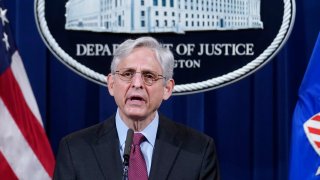
- Attorney General Merrick Garland on Wednesday announced that the Department of Justice will investigate the practices of the Minneapolis Police Department.
- The announcement comes one day after former Minneapolis police officer Derek Chauvin was convicted by a jury of the murder of George Floyd, an unarmed Black man, who was killed in custody last year.
Attorney General Merrick Garland on Wednesday announced that the Department of Justice is launching an investigation into the practices of the Minneapolis Police Department.
"The investigation I am announcing today will assess whether the Minneapolis Police Department engages in a pattern or practice of using excessive force, including during protests," Garland said during a news conference.
The announcement came one day after former Minneapolis police officer Derek Chauvin was convicted by a jury of the murder of George Floyd, an unarmed Black man, who was killed in custody last year. Video of Chauvin kneeling on Floyd for more than nine minutes while the handcuffed man struggled to breathe sparked protests around the country.
Get Tri-state area news delivered to your inbox.> Sign up for NBC New York's News Headlines newsletter.
Garland said the investigation will also examine whether the department's treatment of individuals with behavioral health disabilities is lawful. He said the DOJ had already begun outreach to the local community.
"Yesterday's verdict in the state criminal trial does not address potentially systemic policing issues in Minneapolis," Garland said.
Watch live: Merrick Garland announces investigation into Minneapolis police department
Money Report
The Justice Department probe is known as a pattern-or-practice investigation. The DOJ had earlier announced a separate investigation into whether Chauvin violated Floyd's civil rights.
During his remarks, Garland emphasized that he believed that the majority of the nation's police officers did their best to uphold the law.
"I strongly believe that good officers do not want to work in systems that allow bad practices. Good officers welcome accountability, because accountability is an essential part of building trust with the community, and public safety requires public trust," Garland said.
Pattern-or-practice investigations, the Justice Department has said, often examine "whether the police department has engaged in a pattern or practice of stops, searches, or arrests that violate the Fourth Amendment; use of excessive force; discriminatory policing; violation of the constitutional rights of criminal suspects; or violation of First Amendment rights."
If the DOJ concludes that a police department has systematically violated the law, it can pursue a settlement, often known as a consent decree, which sometimes entails independent monitoring or other reforms. The agreement must be approved by a court. Garland earlier this month rescinded a memorandum signed during former President Donald Trump's term that limited the use of consent decrees.
"The Department of Justice will be unwavering in its pursuit of equal justice under law," Garland said.
"The challenges we face are deeply woven into our history. They did not arise today or last year. Building trust between community and law enforcement will take time and effort by all of us, but we undertake this task with determination and urgency knowing that change cannot wait," Garland added.
In a statement issued after Chauvin's guilty verdict was announced, Garland said that while "the state's prosecution was successful, I know that nothing can fill the void that the loved ones of George Floyd have felt since his death."
Garland said in the statement that the previously announced civil rights investigation was "ongoing."
President Joe Biden pledged after Chauvin was convicted that he would push forward on reforming the nation's policing.
The verdict "can be a giant step forward," Biden said. "We can't stop here."
House Democrats have passed police reform legislation named after Floyd. The George Floyd Justice in Policing Act was approved in the House of Representatives by a vote of 220-212 but has not yet received a vote in the Senate, where it is considered unlikely to pass.
The bill would limit the use of controversial police tactics like chokeholds and no-knock warrants, and restrict federal qualified immunity, a legal shield that protects officers from civil suits and has been criticized for providing impunity to those who use excessive force.
Chauvin was convicted of second-degree murder, third-degree murder and second-degree manslaughter. Judge Peter Cahill said that he will be sentenced in eight weeks. Chauvin faces a potential sentence of several decades in prison.
Garland said that the pattern-or-practice investigation will be staffed by the Justice Department's civil rights division and the U.S. Attorney's Office for the District of Minnesota.
Subscribe to CNBC Pro for the TV livestream, deep insights and analysis on how to invest .






